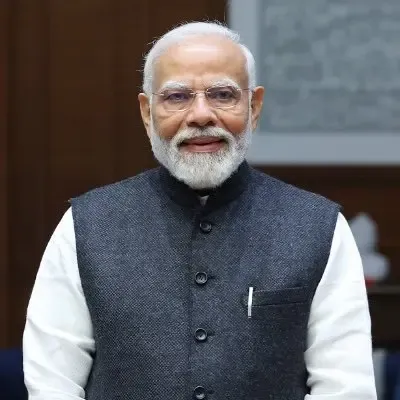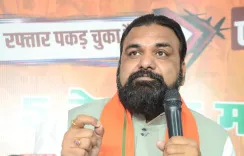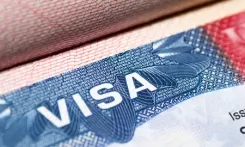How is PM Modi's economic vision shaping India amidst global trade changes?

Synopsis
Key Takeaways
- PM Modi emphasizes reducing dependency on foreign nations.
- Self-reliance is crucial for India's economic sovereignty.
- Global trade policies are shifting towards protectionism.
- 'Atmanirbhar Bharat' initiative aims to boost local production.
- Diversification of export markets is essential for resilience.
New Delhi, Sep 20 (NationPress) Prime Minister Narendra Modi addressed the citizens of India on Saturday, calling for a united effort to reduce reliance on foreign nations, a sentiment echoed by various research and statistical analyses.
He emphasized that the future of 1.4 billion Indians should not be dictated by external influences, nor should the commitment to national growth hinge on foreign aid.
This address took place during the 'Samudra se Samriddhi' event in Bhavnagar, Gujarat.
Previously, on Independence Day, from the historic Red Fort, the PM articulated his vision for India's future.
"In an era marked by increasing economic self-interest, it's crucial to enhance India's capabilities, broaden opportunities, and empower our citizens. These reforms signify the start of a transformative governance phase, ensuring India becomes more resilient, inclusive, and competitive on the global stage," stated PM Modi.
Support has poured in from Indian entrepreneurs and political leaders for the Prime Minister's vision, advocating for a self-reliant economic framework to mitigate global challenges.
Recent reports from organizations such as the UN Conference on Trade and Development (UNCTAD), the World Trade Organization (WTO), and the International Monetary Fund (IMF) have spotlighted a global shift towards protectionism and its disruptive consequences, implicitly endorsing self-reliance as a strategic necessity.
This month, a UNCTAD report indicated a significant shift in US tariff policies, describing it as "a departure from the principles that have supported the international trading system for 30 years since the establishment of the WTO."
The report concluded that vulnerable economies should focus on diversifying export markets, enhancing value-added production, and forming alliances within multilateral forums and regional trade blocs.
Such unpredictable global trade dynamics will likely compel nations to adopt more self-sufficient policies as a form of strategic assurance.
Fitch's economic monitor recently reported a slowdown in global trade volume growth in the second quarter of 2025, following an earlier surge driven by "front-loading" before new tariffs.
This volatility and the threat of protectionism in global steel markets led Fitch to recognize that changing trade patterns will make self-reliance increasingly important.
Oxford Economics has also examined the resurgence of protectionism due to US tariff actions and retaliatory measures from other countries. Their analyses suggest that while tariffs disrupt the global economy, they also compel nations and businesses to reassess supply chains and diversify trade, which are central to the self-reliance concept.
A report from Motilal Oswal analyzed US tariff initiatives, concluding that although they pose challenges to India's export sector, they also present an opportunity for India to strengthen its domestic industries.
By strategically implementing import duties, India can lessen its reliance on foreign goods and enhance local production, thereby advancing the 'Atmanirbhar Bharat' (self-reliant India) initiative.
In April, The Economist remarked that "since Prime Minister Narendra Modi took office in 2014, India has raised tariffs as part of its strategy to boost domestic manufacturing, also introducing production-linked incentives (PLIs) to attract foreign manufacturers."
This was during the period when US President Donald Trump initiated reciprocal tariffs against trade partners, including a hefty 27 percent levy on Indian products.
Many experts have interpreted the US tariff imposition as a driving force for India to achieve greater economic self-sufficiency.
Following a 50 percent tariff on Indian goods by the US, the Observer Research Foundation (ORF) characterized it as a catalyst for India’s pursuit of enhanced economic sovereignty.
The Modi government’s 'Atmanirbhar Bharat Abhiyan', launched in 2020, has emphasized self-reliance through structural reforms and PLI schemes.
This is the context referenced in The Economist article.






